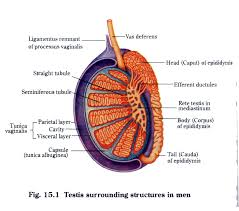testis
英 [ˈtes.tɪs]
美 [ˈtes.tɪs]
- n. [解剖] 睾丸
星级词汇:

中文词源
testis 睾丸
来自拉丁语 testis,睾丸,词源同 test-,见证,证明。比喻用法,即见证男人之物。
英语词源
- testis (n.)
- (plural testes), 1704, from Latin testis "testicle," usually regarded as a special application of testis "witness" (see testament), presumably because it "bears witness to male virility" [Barnhart]. Stories that trace the use of the Latin word to some supposed swearing-in ceremony are modern and groundless.
Compare Greek parastatai "testicles," from parastates "one that stands by;" and French slang témoins, literally "witnesses." But Buck thinks Greek parastatai "testicles" has been wrongly associated with the legal sense of parastates "supporter, defender" and suggests instead parastatai in the sense of twin "supporting pillars, props of a mast," etc. Or it might be a euphemistic use of the word in the sense "comrades." OED, meanwhile, points to Walde's suggestion of a connection between testis and testa "pot, shell, etc." (see tete).
权威例句
- 1. The male gonads , the testis, lie outside the abdomen within the scrotum.
- 公畜的生殖腺 -- 睾丸, 位于腹壁外的阴囊内.
- 2. Sometimes the testis fails to enter the scrotum.
- 有时睾丸未能降入阴囊.
- 3. The testis sacs communicate with the seminal vesicles.
- 精巢囊与储精囊相连.
- 4. A small rim of remaining normal testis appears at the far right.
- 最右边是残留正常睾丸的少量边缘.
- 5. The result of micronucleus and testis chromosome assay were negative.
- 微核和睾丸染色体畸变试验结果均为阴性.